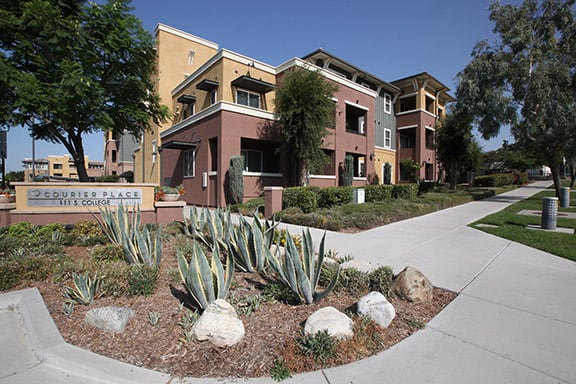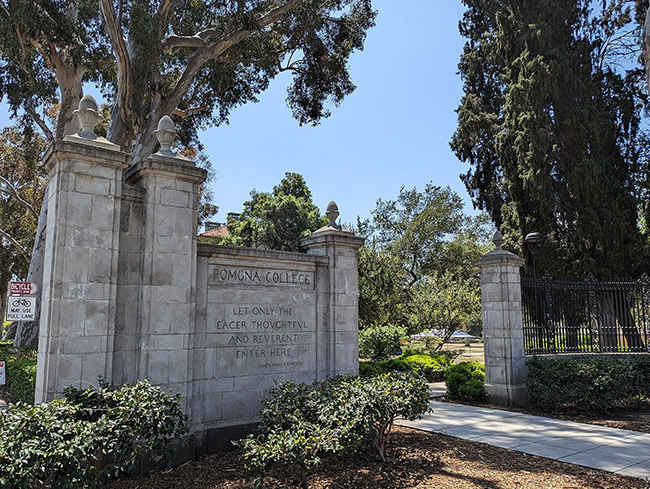Council passes housing ordinance, but decouples it from Village South

By Steven Felschundneff | steven@claremont-courier.com
A lengthy tussle between affordable housing advocates on one side and a chorus of residents along with a local developer on the other, moved one step closer to a resolution Tuesday when the Claremont City Council voted to adopt a new Inclusionary Housing Ordinance but delay the implementation for 180 days.
“The eight-hour journey was not perfect but I am happy with where we finally arrived.” Mayor Jennifer Stark said of the marathon council meeting. “We ended up with a code amendment that will increase our affordable housing stock and we avoided unaccounted for ramifications to pipeline projects.”
The delay in implementation was a big win for Village Partners and Arteco Partners, the builders behind South Village, which is scheduled to be the first development under the Village South Specific Plan. Initially the redesigned affordable housing rule was to take effect in tandem with VSSP so that low-income units would be mandated in South Village.
Mayor Stark said there was inadequate time to study the possible implications of tying the VSSP to the housing ordinance. She also expressed concern that the years of work Claremont’s staff as well as the developer had put into the proposed transit oriented development could derail what would otherwise be a great opportunity for the city. The South Village plan also includes market rate rental units, something that has not been built in Claremont since the 1980s.
“Just because this mandate doesn’t apply to Village South it doesn’t preclude the fact that we can find ways to get some low affordability in there. We can work with them,” Mayor Stark said.
The ordinance would require any future development of five for sale units or more to include 10 percent for moderate income and five percent for low-income buyers. Similarly, any rental construction would have to include 10 percent for moderate and five percent for low-income earners.
The Claremont City Council voted July 13 to tie the implementation of the VSSP, a top priority of the planning department, to the passage of a new ordinance. That created an emergency situation to push the new rule through the planning commission which included a special meeting held on August 10, a month that is typically set aside for staff, council and commission vacations.
In 2006 the city council first adopted its Inclusionary Housing Ordinance, which requires developers to construct affordable units at a ratio of either fifteen percent for moderate income or ten percent of low-income households. However, since its inception, zero low-income units have been built and just 67 moderate units have been approved including 21 currently under construction.
Although Mayor Stark fully supported revisiting the ordinance, she expressed reservations about the process, in particular the short timeframe to get the deal completed. Reached by phone on Wednesday, she expressed some regrets at agreeing to the rapid schedule, which required the rule be passed Tuesday so that there could be a second reading later in the month. The VSSP and the housing ordinance were set to become the law of the land on October 29.
“The process issues got in the way of us giving adequate time for our community to really get involved [and] to really clearly understand what the trade-offs are,” she said during Tuesday’s meeting,”
Tying the implementation of the VSSP to the new housing ordinance was a priority of Mayor Pro Tem Jed Leano, who pointed out during Tuesday’s meeting that the entire council agreed to the meeting schedule when they approved the VSSP in July.
However, as the meeting progressed, and it became increasingly clear that the previously approved schedule did not have popular support, Mr. Leano was willing to compromise to save the ordinance.
“My initial plea to this council that we take original proposal that was brought forward from planning and make it effective immediately, clearly does not have support and the fact that we disagree on that topic doesn’t in any way prevent me from looking for the next and better opportunity for us to get something done on this,” Mayor Pro Tem Leano said. “What was presented to us, albeit fast by our own direction, is really innovative and to lose what we put together here because we disagree on the effective date I think is an error.”
The revised ordinance passed, 4-1, with councilmember Corey Calaycay casting the lone no vote.
He expressed frustration that the focus on solving Claremont’s affordable housing problems has always been on building more housing rather than subsidizing existing units. “You say on the one hand we have a water crisis, but you keep building and building,” he said.
Mr. Calaycay noted that people are leaving the state in such numbers that California is losing a representative in Congress, and yet home prices are going up.
“That tells me we have a lot of investors involved that are up bidding a lot of the real estate,” he said.
Mr. Calaycay expressed support for decoupling the state’s Regional Housing Needs Assessment from only identifying new construction opportunities, which could open the door for cities to satisfy their RHNA requirements by identifying existing housing that could be made affordable.
The percentages of affordable units as passed by the council were on the conservative side but they left the door open to revisiting the issue periodically as conditions change and the council receives further input from both city staff and the community.
As the city begins the process of updating its housing element as required by state law, other solutions to affordability can be found including the possibility of using accessory dwelling units as part of the RHNA requirements.
“The inclusionary housing ordinance is one tool that can help us address increasing affordability,” Mayor Stark said. “Our housing element will help us uncover a whole suite of tools to address affordability in Claremont. And these will be great discussions, and I can’t wait to have them with the community.”
Mayor Stark expressed a sentiment that Claremont as a whole wants to get affordable housing built but we aren’t served well by seeing the other side of a complex issue as the enemy. Like the NIMBYS versus the YIMBYS or pro-development as opposed to saving humanity.
“One of the things we heard loud and clear was that the community wants to put people first.
And I love that. But do we put people first when we make our point through rhetoric that dehumanizes and divides? I think we can go further, together. And I think that divisive language and political dog whistles that intentionally oversimplify the nuanced and complicated issue of housing isn’t helping,” she said.










0 Comments